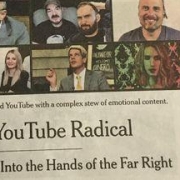Earlier this year, the New York Times ran an opinion piece written by David Adler. The title of the article is Centrists Are the Most Hostile to Democracy, Not Extremists. A title like that assumes that words like centrist and extremist have widely accepted meanings. They don’t; they exhibit the cheap, louche language of identity groupthink.
Increasing the verbal confusion, here the author uses the politically correct model of left vs. right, or, to be more precise, the version that was adopted by welfare state apologists in the 1950s:
On the right, ethno-nationalists and libertarians are accused of supporting fascist politics; on the left, campus radicals and the so-called Antifa movement are accused of betraying liberal principles.
In this introduction, Adler is equating democracy with liberal principles and fascism with the extreme right. He is suggesting that thugs clad in black are misunderstood, and he accepts the attacks on libertarians without reservation. But according to dictionary.com, libertarians are: 1. a person who advocates liberty, especially with regard to thought or conduct. 2. a person who maintains the doctrine of free will.
So isn’t the attack on libertarianism as fascist a contradiction? One that Adler accepts? And who are these centrists? What is it about democracy that they oppose, or liberal principles that they don’t understand? He makes no attempt to reconcile these contradictions.
What Could Possibly Go Wrong?
To provide academic support for the conclusion in the title of his article, the author cites data from the World Values Survey and the European Values Survey. He touts them as “two of the most comprehensive studies of public opinion carried out in over 100 countries.” In the World Values Survey there are 290 questions divided into 14 categories. The categories with the highest number of questions (35+) are social values, social capital, political interest, and demographics. The two categories with the fewest questions (6) are economic values, and science and technology.
Obviously, the brain trust behind this survey doesn’t know or care that economic values and science drive all human progress. One question in the survey asks respondents to rank themselves on a spectrum of far left, to center, to far right based on some contrived definition of left and right. The Times article doesn’t question these false premises, but it does identify some contradictions in the data.
The expected outcome is that the extreme left and right would prefer authoritarian systems. However, Adler’s analysis of the survey data concludes that it is the centrists who prefer authoritarian leaders, presumably because they will deliver stability and growth. The data cited for this conclusion is that only 42% of European “centrists” thought “democracy is a very good system,” and only 33% of American “centrists” thought so. In both cases, the so-called left and right extremists preferred democracy more than centrists.
This contradiction is central to the article, but the data is the data, right? To fail to challenge the definitions offered or the structure of the survey can only serve one motive – egalitarianism, meaning all political ideologies have merit. The article also finds that the self-identified centrists generally do not support free and fair elections or protection from state oppression, but apparently extremists do. The author’s conclusion is that extremists view liberal democratic institutions more favorably. What could be the motive for accepting this survey and its data at face value?
The Fallacies of Confusion vs. the Realities of the Economic Way
Adler’s so-called research masquerading as objective analysis of survey data is absurd, and the fallacies are easy to identify and correct. Here is a list of just some the false premises and corrective measures.
- Fascism does not belong on the far right of the political spectrum. It is a form of collectivism. All forms of collectivism belong on the left (fascism, socialism, ethno-nationalism, etc.). Individualism belongs on the right, assuming a left-right model is even useful.
- Centrists are not defined at all, except by what they are not. Most likely these respondents prefer a welfare state, and they don’t care how it is enacted. In the annals of human history, economic and political freedom are extreme outlier events. A centrist, by definition, will vote freedom away in favor of personal security.
- Democracy is not a classically liberal principle. It leads to mob rule, such as campus radicals, Antifa, fascism and ethno-nationalism. The constitutional Republic is the classically liberal system of government with democratic elections for specific needs.
Accordingly, it makes sense that the extreme right and left in this survey would favor a mob rule style of democracy. Maybe that’s what the centrists were afraid of. It would be better to create a survey that compares economic and political freedom with central economic planning.
The survey, as extensive as it is, and regardless of its statistical reliability, is egalitarian, inherently collectivist, and destructive in its priorities. A survey focused on the essentials for human flourishing would be revealing. What a concept.
The Survey That Matters Most
The most reliable survey ever conducted is people making voluntary choices with their money. Their choices include the basic needs for living well, saving for the future, buying equipment, education, and gifting. Free markets tabulate the results and publish them in the form of prices. Only sociologists funded by central economic planners need studies like the World Values Survey. To them, these surveys are essential to justify their existence. Unfortunately for us, using false premises to evaluate biased data only increases misunderstandings among people.
As individualists, it is important that we reclaim the linguistic territory. In this case, a clear distinction between republicanism and the democratic principles that make it work. And a clear distinction between the collaboration of individualism, the prosperity it creates; versus the coercion of collectivism and the resentment it fosters. There are no contradictions, only the false premises the Times opinion piece left unchecked.










